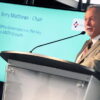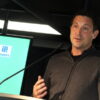“Do not screw this up.”
It became the mantra of the evening, spoken repeatedly by legendary tech entrepreneur Terry Matthews and later echoed by others during a 90-minute presentation Tuesday at the Hub350 RBCx Finance Quarter to emphasize the importance of keeping developers away from the Kanata Golf and Country Club, located in the heart of Kanata Lakes, and the surrounding green spaces.
ClubLink wants to fill in its 18-hole golf course with 1,500 homes through a partnership with Minto Communities and Richcraft Homes. The case is currently slogging its way through the twists and turns of the court system.
(Sponsored)

Local businesses face hiring obstacles due to immigration pullback, flawed screening
In his 39 years of practicing immigration law, Warren Creates (a rare Law Society Certified Specialist) has never seen an environment so challenging for employers looking to hire workers from

Local businesses face hiring obstacles due to immigration pullback, flawed screening
In his 39 years of practicing immigration law, Warren Creates (a rare Law Society Certified Specialist) has never seen an environment so challenging for employers looking to hire workers from
Speak Up for Greenspace was hosted by the Kanata Greenspace Protection Coalition and Kanata North Business Association (KNBA). The evening emphasized the need for Kanata to remain an attractive place for high-tech workers to want to live and work. There are 550 tech companies in the Kanata North business park, employing close to 33,000 people. About 50 per cent of the workers live in the area.
“We’re in a war for talent these days,” KNBA president Jamie Petten said of the more than 1,200 job vacancies in the Kanata North technology park, the largest in Canada. “The stakes could not be higher and the market only continues to be increasingly competitive.”
Losing the golf course to development, the room heard, will harm the future growth of the tech park, which is on the cusp of the “next big things”, including 5G technologies and AI-driven software development. Nobody knows better than Matthews how, in life, timing is everything. He’s built his extraordinary career on catching the right technology waves.
“Do not let ClubLink develop this golf course,” he implored the community at large. “Please don’t do that. That is a gross error and it affects the future growth.”

Matthews, executive chairman of global investment management firm Wesley Clover, pointed out that he has nothing to gain. “I don’t have a home backing onto the golf course,” said Matthews, who, in fact, owns a different golf course in Kanata, The Marshes. “Why am I standing up here? I’m here to defend the community.”
The protection coalition also has on its side former Canopy Growth co-CEO Mark Zekulin. He appreciates how important the outcome of the court case is for communities in similar situations — including his own, Cedarhill, which surrounds the Cedarhill Golf and Country Club in Nepean.
“The work you’re doing and that we’re all here to support doesn’t just impact this community and the businesses in Kanata trying to recruit people, but it affects everyone in Ottawa,” said Zekulin of the ripple effects.

On the issue of attracting and retaining talent, he spoke of previous challenges he faced with Canopy Growth in trying to fill thousands of job positions quickly. “I cannot tell you how difficult it was to recruit the talent that we needed,” said Zekulin (it didn’t help that the headquarters is in Smith Falls, he noted).
“Naturally, we set up shop also here in Kanata and we were able to recruit all that great talent to come here. I’m not saying they all accepted because they wanted to golf but attracting talent is a real issue. I saw it firsthand, and studies do show that the intangibles really do matter. A diverse environment, a diverse community, natural spaces, green spaces — all of these things matter. Frankly, in Ottawa, it has been and continues to be a real differentiator versus other communities.”
Zekulin’s new venture, Invert, invests in carbon-reducing projects around the world. Every little bit counts, he said. “Part of winning this broader fight on climate is winning these little fights along the way. So, protecting these rivers, the fields, the trees, all these things that, for example, go along with the green space in Kanata is part of a bigger picture.”

The room also heard from Steve Willis, the City of Ottawa’s general manager of planning, infrastructure and economic development. He spoke about the need for the Kanata North business park to evolve through the city’s new Official Plan. “But we’re not talking about ripping up forests and greenspace; that is not the plan,” he said. “We can change, we can evolve, we can adapt, which is what the plan is all about … but change does not mean we need to be ripping up those parts that make it attractive because, otherwise, we turn into, oh, another suburb of another American city.”
Sarah Doughty, vice-president of talent operations at TalentLab, also hammered home the message that the high-tech sector is facing “unprecedented levels” of competition.
The trend has become less about employees fitting their lives into a rigid work arrangement, she said, “and more about having their work life fit into their personal lives. That change is really driving talent acquisition today.”
Mark Tremblay, a professor in the faculty of medicine at the University of Ottawa, spoke about the benefits of exercising outdoors as it relates to urban green spaces (or white spaces in the winter).
Even more eye-opening was his personal story. The married father of four was recruited to move with his family to Ottawa nearly 20 years ago. What got him to seal the deal was finding a home in Kanata Lakes that he loved. It backs onto the golf course. Out in front, there’s a path that leads to a park.
“We’ve been here 19 years and I plan to stay here, but if the golf course develops I will be leaving immediately and I suspect the same thing will be the case with your talent.”







caroline@obj.ca




